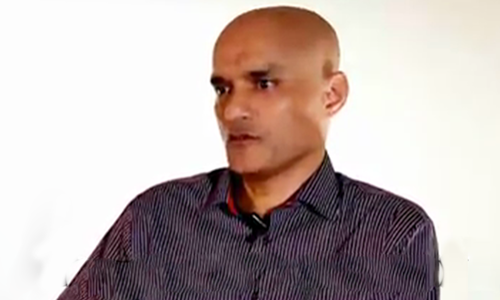ISLAMABAD: The Islamabad High Court on Monday assured the Indian High Commission’s lawyer of fair trial of convicted spy Kulbhushan Jadhav and suggested a third consular access in order to implement the International Court of Justice’s directive for review and reconsideration of conviction.
A three-judge IHC bench comprising Chief Justice Athar Minallah, Justice Aamer Farooq and Justice Miangul Hassan Aurangzeb also hinted at providing lawyer Shahnawaz Noon of necessary documents related to the court martial proceedings against the Indian spy since he was earlier denied these documents for not having paper of attorney or wikalatnama from the Indian High Commission.
Justice Aurangzeb joined the bench from home through a video link as is in quarantine due to Covid-19.
Justice Minallah says all court wants is assistance from India to implement ICJ verdict in letter and spirit
While the Indian High Commission seems reluctant to engage a lawyer for Jadhav, Mr Noon appeared before the high court for the release of another convicted Indian spy, Mohammad Ismail, who had completed his sentence in a Pakistani jail.
Attorney General Khalid Jawed Khan highlighted the double standards in cases of Jadhav and other convicted Indian citizens and said that the Indian government had recently filed a petition for the release of eight convicts, but in the Jadhav case it expressed fear of compromising sovereign immunity if the High Commission allowed appointment of his lawyer.
Commander Jadhav, a spy of Research and Analysis Wing (RAW), was arrested in Balochistan in March 2016. The Field General Court Martial had sentenced him to death on April 10, 2017 for fomenting terrorism in Balochistan and Karachi.
India later moved the International Court of Justice against the verdict. The ICJ had on May 18, 2017 stayed his execution pending a final judgement in the case.
On July 17 last year, the ICJ rejected India’s appeal for Jadhav’s release, but ordered Pakistan to suspend the execution. It also ruled that Pakistan would have to review the entire process of trial and conviction and provide India consular access to the spy.
Pakistan also promulgated the ICJ (Review and Reconsideration) Ordinance 2020 to comply with the ICJ verdict.
Attorney General Khan read out an earlier Indian ‘note verbale’ in which New Delhi had raised several objections and expressed apprehension of compromising sovereign immunity if the High Commission would consent for appointment of a lawyer for Jadhav.
Shahnawaz Noon informed the court that he was earlier appointed as Jadhav’s counsel but was denied the copy of trial proceedings.
At this, the attorney general pointed out that the Indian High Commission did not give paper of attorney or wakalatnama which was a prerequisite for obtaining such record.
Justice Minallah said that in such an eventuality the counsel may file a petition in the IHC for provision of necessary documents required for the court’s hearing. “All we want is assistance from India through its High Commission to implement ICJ judgement in letter and spirit,” the chief justice said, noticing that the High Commission’s appointed counsel for other Indian prisoners, Shahnawaz Noon, was present in the court to pursue the case.
When the court asked why the Indian government was reluctant to provide assistance in the Jadhav case, Mr Noon said both governments had been communicating but India had certain reservations.
Justice Minallah recalled that the ICJ instructions stated that Pakistani laws had to be followed and they could not be exempted.
Mr Noon said he had spoken to the High Commission officials and they had a meeting with New Delhi.
Seeing the counsel’s reluctance to reply, Justice Minallah asked if he wanted to take instructions from his client.
Mr Noon said he needed one week’s time to do so.
Subsequently, the court adjourned the hearing till Dec 1.
Published in Dawn, November 10th, 2020














































